UNDERGRADUATE RESEARCH BLOGS
The Office of Undergraduate Research sponsors a number of grant programs, including the Circumnavigator Club Foundation’s Around-the-World Study Grant and the Undergraduate Research Grant. Some of the students on these grants end up traveling and having a variety of amazing experiences. We wanted to give some of them the opportunity to share these experiences with the broader public. It is our hope that this opportunity to blog will deepen the experiences for these students by giving them a forum for reflection; we also hope these blogs can help open the eyes of others to those reflections/experiences as well. Through these blogs, perhaps we all can enjoy the ride as much as they will.
EXPLORE THE BLOGS
- Linguistic Sketchbook
- Birth Control Bans to Contraceptive Care
- A Global Song: Chris LaMountain’s Circumnavigator’s Blog
- Alex Robins’ 2006 Circumnavigator’s Blog
- American Sexual Assault in a Global Context
- Beyond Pro-GMO and Anti-GMO
- Chris Ahern’s 2007 Circumnavigator’s Blog
- Digital Citizen
- From Local Farms to Urban Tables
- Harris Sockel’s Circumnavigator’s Blog 2008
- Kimani Isaac: Adventures Abroad and At Home
- Sarah Rose Graber’s 2004 Circumnavigator’s Blog
- The El Sistema Expedition
- The World is a Book: A Page in Rwand
Mackenzie’s Additional Podcast and Blog
Hello all,
Flights are booked, everything is ordered, and the remaining accommodations/insurance are falling into place as I write.
I wanted to update you all on my podcast, The Book Album, and its accompanying blog, The Panopti-Blog.
While I will not update either resource as often as this blog, I will share more about my travels and my interests via those mediums.
Cheers,
Mackenzie
May 26, 2022 Vivica’s Test Post
Hello! This is my first post to test out the blog before I start traveling this summer.
Mackenzie’s Trip Preparation—and Packing!
Hello all,
I need to test-run a blog post, so I thought I would quickly review my travel preparations. The trip is well on the way to enough organization to travel under. I need to secure a few more accommodations, but other than that, the little details are what I am working on. Specifically: packing. My search for packing optimization began the first few times I traveled. I am fortunate that my mother prioritized trips starting from when my brother and I were toddlers, as she thought it important that we learn the lessons only travel can teach us (e.g. humility, independence, awareness). Even then, I remember questioning why my mother packed certain things for me versus my brother. I remember packing my own suitcase for the first time on a second grade trip to Las Vegas to visit family. Of course, I also remember much more recently packing for my moves to Chicago, Canada, and Germany. I now am faced with the packing dilemma of my circumnavigation followed shortly thereafter by my move to Austria. But: all will turn out well. I am, after all, a seasoned packer.
Cheers,
Mackenzie
Getting Started
Hello all, and welcome to Linguistic Sketchbook! The name of this blog derives from the title of my podcast and personal blog, The Book Album (host of the Panopti-Blog). I hope to create a discourse between the two online spaces as I travel and update both blogs. I started preparing for this trip in January 2021, when I initially won the award. Therefore, I find it remarkable and lucky that I will still complete the trip and its corresponding research.
What I hope to gain from the experience is threefold:
1. A greater, more personal appreciation of the world—and the people in it;
2. A launchpad for my future linguistic research in second language acquisition; and
3. Memories and experiences that I can pass on to future generations. In turn, I bring my curiosity, tenacity, and joy to the experience.
Cheers,
Mackenzie
Mackenzie’s Third Test Post
Hello all,
I hope this blog message finds you well. We are test-running the blog as one of our last checks before I graduate and travel!
Cheers,
Mackenzie
Finn
Finn Wintz
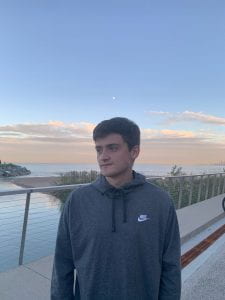
Please provide the tile and a brief summary of your research/conference presentation.
My research with Dr. Onnie Rogers focused on how Black and White parents justify their perceptions of race, and specifically how they rationalize colorblindness. Parents were asked: “How do you think your life would be different if you were Black/White?”, where Black parents answer about being White, and White parents answer about being Black. The first part was multiple choice. Parents selected that their life would be (1) Better, (2) the Same, or (3) Worse. The second part asked parents to explain their answer choice in a free response. We inductively coded and thematically analyzed open-ended responses where parents believed that their life would be the same. We found that there are multiple qualitatively distinct ways parents justify colorblindness, including foregrounding individual autonomy, erasure of race, diversion from race, and emphasizing inherent commonalities.
What made you initially interested in researching your project in particular?
I took a developmental psychology class with Dr. Rogers in the fall of my first year and absolutely loved both her and her topic of research.
What conference(s) did you present at and how did you find out about them?
I had the opportunity to present my findings at the Northwestern undergraduate research expo, and the Society for Personality and Social Psychology expo. Dr. Rogers encouraged me to apply to both and I was fortunate enough to be accepted. Both were spectacular learning experiences!
What was it like presenting at a conference? Anything that you didn’t expect?
Both of my presentations were virtual, so they were very different from what I would imagine an in person conference to be like. One thing that I did not expect was how difficult it can be to distill hours and hours of work into a five minute presentation. Without clear and understandable articulation of results, even high quality research becomes useless.
Any tips or advice you have for students similar to you that are interested in presenting at a conference one day?
Do not be afraid to try for opportunities even if you feel unqualified. Even if you don’t get them, you will learn a lot from the experience of preparing for it, which will make you better equipped for the next try.
What is your most useless talent?
I can make a clover with my tongue.
Ella
Ella Bartt
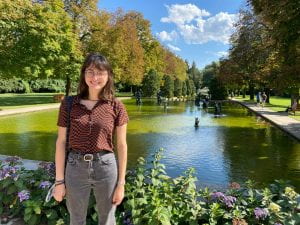
Please provide a brief summary of your research.
As a research assistant for Professor Coronado, I have been archiving the works of Elena Izcue, a Peruvian artist from the early 20th century. Next, I will be helping him go through a large collection of records of música serrana, music from the Andean region.
What made you initially interested in researching your project in particular?
I am interested in Latin American art, especially as it pertains to themes of gender and indigeneity.
What made you interested in pursuing (interdisciplinary) research more broadly?
I have always been interested in art and literature, but I feel that Latin American art is extremely under researched in the U.S., especially more recent 20th century art/literature by women.
Describe your experiences with research thus far. Was it tricky? What skills do you think you’ve gained?
It’s been very interesting so far, and I have definitely learned a lot about how to categorize and archive materials.
Any tips or advice you have for students similar to you that are interested in pursuing undergraduate research?
I started by asking a professor I liked if he needed any help and that’s what got me here, so there’s definitely more than one way to start! Also, there’s research to be done in every academic area imaginable.
If you had unlimited time, money, resources, support, etc. what is something you would research?
I would want to do a project on female textile artists, especially in the context of textile art being commonly denoted as a “craft” instead of art.
What meme lives rent free in your head?
Kim there’s people that are dying
Favorite breakfast food?
Cereal
What’s the most interesting thing you’ve learned/read about/listened to this week?
I went to the MCA and learned about Andrea Bowers. I really liked her exhibit, it was huge!
What is your most useless talent?
I’m really good at Mario Kart!
Alumni Feature
Alum Feature
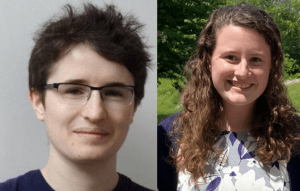
Coline Ferrant (URAP Mentor, left) & Molly Sheridan (URAP Mentee, right)
We’re happy to introduce Coline Ferrant and Molly Sheridan, a URAP mentor/mentee duo from 2018/2019! These two just published their URAP work as a working paper (read here). We caught up with Coline, who is now an Assistant Professor at the American University of Central Asia in Bishkek, Kyrgyzstan, and Molly, who is applying to graduate programs in audiology!
Coline, please provide a brief summary of your research.
Coline: Generally, my research interests include urban & rural sociology, food & eating, ethnography, and public writing. Specifically, within URAP, our project was about barriers to participation in the WIC (Women, Infants, and Children) program and involved fieldwork in two WIC Centers, in Pilsen and Gage Park.
Molly, what made you initially interested in researching your project in particular?
Molly: 3 things initially drew me to the project: it aligned with my interests, allowed me to learn something new, and allowed me gain research experience in the process. I am extremely interested in working with children and families in the future. I have been accepted into the Doctor of Audiology program at UW-Madison and intend to work in pediatrics, which will also involve a lot of working with families. Working on this research with Coline gave me the chance to be in Chicago, implementing a survey, and interacting with families. In that aspect, it supported my future interests and goals. I could also learn for the first time about WIC centers, the barriers to family participation, and how to ease these barriers. I loved that it was such meaningful work.
What have you found the most rewarding about working with one another?
Coline: As a mentee, Molly was conscientious and responsive to feedback. As a co-author, I appreciated the maturity and concision of her writing. All along, she completed tasks rigorously and on time, and I had absolute trust in her.
Molly: I gained a lot more from Coline than just the research knowledge. Coline was a great mentor – she had trust in my abilities and gave me real work instead of just busywork. She helped me feel competent and confident in my research and writing abilities. She was always accessible for me to ask questions and walked me through the steps before asking me to do it on my own. She became a resource for me throughout our research experience, and also afterward, as she was recently one of my graduate school recommenders. I am endlessly thankful that we were able to work on this project together, and for all of her help and advice afterward as well.
Molly, how do you feel your URAP (or overall research) experience prepared you for grad school?
Molly: Coline was a PhD student during our URAP experience, so I learned a lot about what it’s like to be a PhD student and what it takes to get there. It helped me decide between getting a PhD or a Masters, and prepared me for my future decision. On my graduate school application, there was a question specifically asking about my research experience. I am confident that participating in URAP contributed greatly to my application, as I had real research experience (and a publication) that came out of it.
In addition, my future graduate school experience will involve a capstone research project. I know some of my peers are worried about that aspect of the program, but I feel confident about it after this experience.
Coline, how was your experience shifting from URAP mentor to co-author?
Coline: All smooth and organic. Both Molly and me were interested in having the project deliver. This involved transforming our working relationship from a vertical one to a horizontal one, and it happened pretty naturally.
What was it like finalizing your publication together? Anything that you didn’t expect?
Coline: The publication process took time – as usual in research. Nothing unexpected for me!
Molly: I truly did not know anything about writing a publication, choosing a journal, formatting it for submission, and revising it later. Coline involved me in the process every step of the way and I learned so much. I would never have embarked on this journey without her – it seems very daunting until you’ve done it! I would say that I was most surprised by how long the process took (Covid probably didn’t help though).
Any tips or advice you have for students similar to you that are interested in pursuing undergraduate research? What is something you wish students knew about research?
Coline: Research really is an opportunity to investigate in depth a topic or an issue you find curious or interesting.
Molly: Don’t be afraid to apply or reach out to your TA, professor, etc. Coline was my TA and I was pretty much the only one that participated in discussion, so that’s how we met. If you’re interested in something, find out who is researching that topic on campus and reach out. Many students come into these positions without past research experience, so don’t worry if that’s you. I had a few past management positions and they did not relate to research at all, but they demonstrated my ability to work independently, which was crucial for our URAP/publication experience. No matter what field you’re going into or what degree you may be pursuing next, research will always look good on a resume and support your next move. You’ll also make close relationships with those who can support you in your next step with things like letters of recommendation.
Favorite breakfast food?
Coline: Tacos al pastor!
Molly: Waffle with chocolate chips and whipped cream!
Joy
Joy Chou
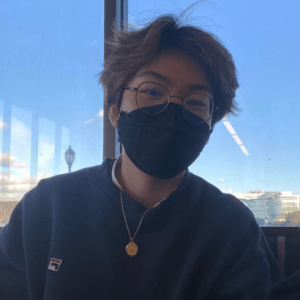
Please provide a brief summary of your research.
I am currently assisting professor Richard Ashley on his “Wayfinding” project. The research focuses on the effects of linguistic, mathematical, and other symbolic processing on musical comprehension. We are utilizing the music21 toolkit to analyze musical scores in terms of form, harmonic progression, melodic structure, and their interaction with musical expectations. The music21 toolkit uses Python to help us program a musical prediction model – the codes that we are aiming to generate will predict and quantify disparities between musicians and everyday listeners’ musical experiences based on their understanding of music structure.
What made you initially interested in researching your project in particular?
I am a dual degree student in music cognition and psychology, so I have always been very interested in exploring the intersection between music and cognitive sciences. In classical western music theory, we talk at length about musical expectations and how chords progress in a way that either confirms or subverts our expectations. I thought it would be very valuable to approach this phenomenon from a more mathematic and quantitative perspective.
What made you interested in pursuing (interdisciplinary) research more broadly?
I feel that there are many overlaps between music, cognitive sciences, and psychology that have not been explored at length. I wish to provide a fresh perspective (as a classically trained instrumentalist/composer) and investigate the various ways music impacts our lives. This is a topic that I am deeply passionate about, and I feel that there is not a segment of this area of study that can be completely separated from one another.
Describe your experiences with research thus far. Was it tricky? What skills do you think you’ve gained?
It has been very exciting and fulfilling working with Dr. Ashley and my lab partners. The project felt a little intimidating when I first started, given that I had to read over forty chapters of Music21 Toolkit documentation and learn how to code in python from scratch in the span of two weeks. I also read a large volume of research on musical expectations and generative models that provide context for our research. Despite it’s initial difficulty, I have learned so much from this experience in both computer programming, problem-solving and critical thinking skills. I was able to code an entire sequence of chord progressions and generate an original sequence of codes that perform “scale-degree finding functions”. Though we are still at a stage of compiling a singular cohesive model, I am hopeful and excited to see the final product of our project!
Any tips or advice you have for students similar to you that are interested in pursuing undergraduate research?
Talk to different faculty members and browse through available URAP projects! Try to see how your studies or interests align with the existing projects – it’ll make the research experience a lot more meaningful to you. Also be open to new ideas and always be ready to learn!
If you had unlimited time, money, resources, support, etc. what is something you would research?
The entire collection of Hayao Miyazaki’s films in conjunction with Joe Hisaishi’s film scores
What meme lives rent free in your head?
the mike wazowski face meme
Favorite breakfast food?
chocolate chip pancake with blueberries
What’s the most interesting thing you’ve learned/read about/listened to this week?
natural coconut water can look pink
What is your most useless talent?
i can blow air donut-like bubbles under water
Krishna
Krishna Sharma
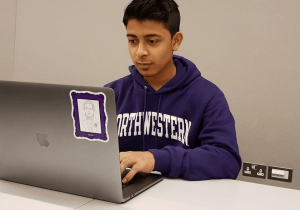
Please provide a brief summary of your research.
I worked on a couple of projects. In one of those, I tried to gauge the role of individual differences in compulsive use of social media platforms such as YouTube. Another was an examination of ephemeral sharing on Facebook and Instagram.
What made you initially interested in researching your project in particular?
When I was working with Dr. Justin Martin on one of his projects on the intrinsic need for orientation, I stumbled upon articles that looked at associations between individuals’ behaviors and their personality traits. Then I read more on such individual differences and started to think about how such differences along with use motivations might affect people’s social media use. On Quora and on Reddit, I had also seen people ask questions about how to fix their “social media addiction,” and that also got me quite interested in the topic that I chose.
What made you interested in pursuing (interdisciplinary) research more broadly?
During my sophomore year, I took a statistics course with Dr. Justin Martin. That course was my first glimpse into a scientific examination of questions in mass media, social media, and psychology. Then when I started reading on media psychology, I started coming up with my own questions. Some of those had already been answered by others, and I just had to look them up on an academic database such as Google Scholar. Some were not. Among those that were not, a few could be answered with the methods I learned in that statistics class. Outside of the class, I have worked as a research assistant for Prof. Justin Martin as well as Prof. George Anghelcev. Both are amazing scholars, and have always encouraged me to follow my curiosity in research. I am very grateful to Dr. Martin and Dr. Anghelcev, as well as Dr. Ilhem Allagui who helped me with one of my projects.
Describe your experiences with research thus far. Was it tricky? What skills do you think you’ve gained?
Before I received this grant, I had mostly only worked for professors (Dr. Justin Martin, Dr. Torsten Menge, and Dr. George Anghelcev) as a research assistant. When you work on projects supervised by your professors, it is methodical in some ways, and they assign you particular things to learn and tasks to complete. I have learnt a lot this way, and I am quite grateful for the experience. But at the same time, I also wanted to grow and do some independent work where I could be my own supervisor. SURG allowed me to do that. I worked on a project with two other student co-authors and after completion, we applied for presentation at the International Communication Association(ICA)’s 72nd conference. Our full paper got accepted and we will be presenting at ICA’s conference in May this year.
During this time, I think I have mostly learned to do independent work, and over the last three years, I have learned that as much as it is about thinking through things, research is mostly reading and writing and re-writing. Being orderly and industrious really helps. In terms of skills, I have learned to do many different types of quantitative analyses necessary for research work in the social sciences.
Any tips or advice you have for students similar to you that are interested in pursuing undergraduate research?
Everybody finds it overwhelming at the beginning. So if you are having those intimidating feelings, please understand that it’s completely natural. Also, this might not be exclusively a research-related advice, but if you struggle with procrastination at times, getting a study partner or a work partner might help. I had a friend with whom I had regular Zoom study sessions, in which both of us would be working on our own research projects. That immensely helped me with my productivity throughout the summer.
Do you have a podcast/documentary/piece of shareable media related to your research?
I am going to present a paper with a couple of other student co-authors at the ICA meeting this year. Here is a link to my paper. If you want to read but the full text is not available for you, just press the button “Request the full text from the author” and I’ll be happy to send it to you.
If you had unlimited time, money, resources, support, etc. what is something you would research?
Two things come to mind: 1. Reducing the spread of fake news, and 2. different forms of problematic use of social media.
Favorite breakfast food?
Milk and cereal.
What’s the most interesting thing you’ve learned/read about/listened to this week?
People become less aggressive if you remove their amygdala. Don’t try it; there are other consequences too.
